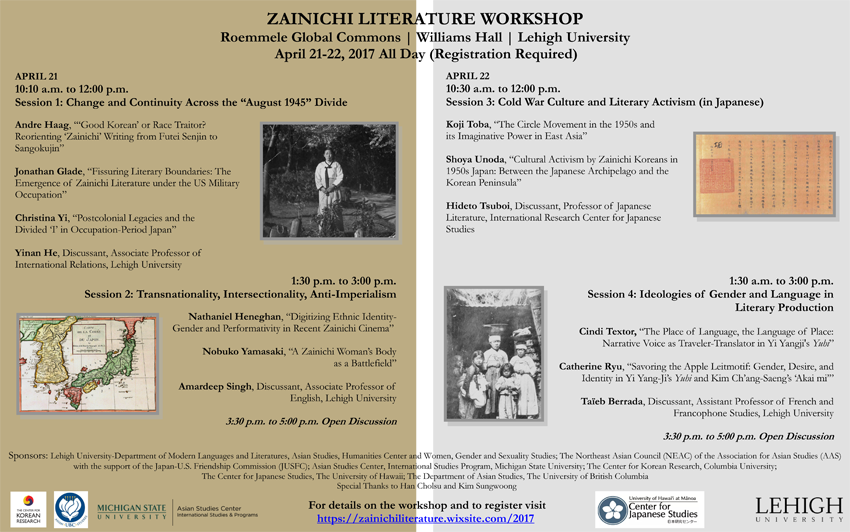Friday, April 21, 2017 - 10:00am
Roemmele Global Commons, Williams Hall

ZAINICHI LITERATURE WORKSHOP
Roemmele Global Commons | Williams Hall | Lehigh University
April 21-22, 2017 All Day
Registration Required.
To register visit https://3pconferenceubc2019.wixsite.com/2017
APRIL 21
10:10 a.m. to 12:00 p.m.
Session 1: Change and Continuity Across the “August 1945” Divide
Andre Haag, “‘Good Korean’ or Race Traitor? Reorienting ‘Zainichi’ Writing from Futei Senjin to Sangokujin”
Jonathan Glade, “Fissuring Literary Boundaries: The Emergence of Zainichi Literature under the US Military Occupation”
Christina Yi, “Postcolonial Legacies and the Divided ‘I’ in Occupation-Period Japan”
Yinan He, Discussant, Associate Professor of International Relations, Lehigh University
1:30 p.m. to 3:00 p.m.
Session 2: Transnationality, Intersectionality, Anti-Imperialism
Nathaniel Heneghan, “Digitizing Ethnic Identity-Gender and Performativity in Recent Zainichi Cinema”
Nobuko Yamasaki, “A Zainichi Woman’s Body as a Battlefield”
Amardeep Singh, Discussant, Associate Professor of English, Lehigh University
3:30 p.m. to 5:00 p.m. Open Discussion
APRIL 22
10:30 a.m. to 12:00 p.m.
Session 3: Cold War Culture and Literary Activism (in Japanese)
Koji Toba, “The Circle Movement in the 1950s and its Imaginative Power in East Asia”
Shoya Unoda, “Cultural Activism by Zainichi Koreans in 1950s Japan: Between the Japanese Archipelago and the Korean Peninsula”
Hideto Tsuboi, Discussant, Professor of Japanese Literature, International Research Center for Japanese Studies
1:30 a.m. to 3:00 p.m.
Session 4: Ideologies of Gender and Language in Literary Production
Cindi Textor, “The Place of Language, the Language of Place: Narrative Voice as Traveler-Translator in Yi Yangji's Yuhi”
Catherine Ryu, “Savoring the Apple Leitmotif: Gender, Desire, and Identity in Yi Yang-Ji’s Yuhi and Kim Ch’ang-Saeng’s ‘Akai mi’”
Taïeb Berrada, Discussant, Assistant Professor of French and Francophone Studies, Lehigh University
3:30 p.m. to 5:00 p.m. Open Discussion
Sponsors: Lehigh University-Department of Modern Languages and Literatures, Asian Studies, Humanities Center and Women, Gender and Sexuality Studies; The Northeast Asian Council (NEAC) of the Association for Asian Studies (AAS) with the support of the Japan-U.S. Friendship Commission (JUSFC); Asian Studies Center, International Studies Program, Michigan State University; The Center for Korean Research, Columbia University;The Center for Japanese Studies, The University of Hawaii; The Department of Asian Studies, The University of British Columbia
Special Thanks to Han Cholsu and Kim Sungwoong
Department:
Women, Gender and Sexuality Studies
